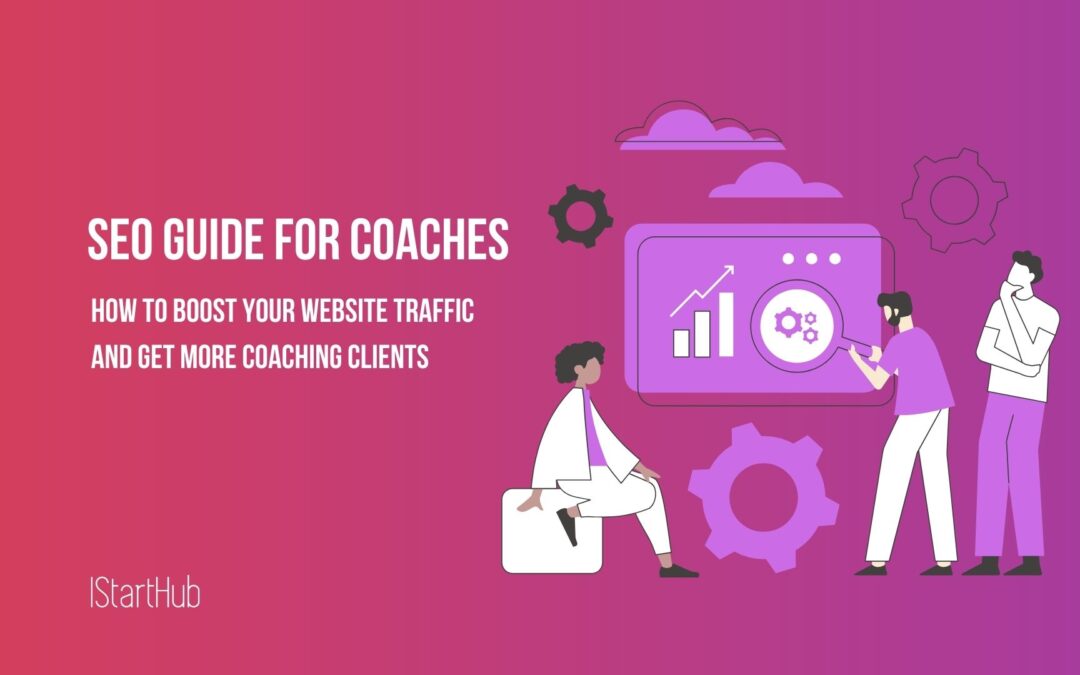As a coach, you have a lot to offer your clients. You can guide them toward achieving their goals and improving their lives. However, the question is how to build a coaching business and get coaching clients without spending big money on marketing. That’s where SEO for coaches comes in.
SEO for coaches, or search engine optimization, is a powerful tool that helps many coaches improve their online visibility on search engines like Google, Bing, and Yahoo. Let’s dive deeper into how coaches can utilize SEO for content marketing by creating authentic and useful content their potential clients will be interested in.
Let’s get started!
- What is SEO for Coaches
- Do Online Coaches and Consultants Need SEO?
- How to Get Coaching Clients with SEO
- An Ultimate Guide to SEO For Coaches
- 1. Finding the best SEO keywords for coaching
- 2. Creating SEO-Optimized Content for Coaches
- 3. Optimize coaching content for SEO
- 4. Converting SEO Traffic to Sales
- 1. What are the Best SEO Keywords for Life Coaching?
- 2. How Do You Optimize a Website for Local SEO?
- 3. What are the Best Practices for SEO in 2024?
- Conclusion
Affiliate Disclosure: some of the links in this article are affiliate links. It means that if you buy through these links, we may earn a small commission to support this website at no cost to you.
What is SEO for Coaches
SEO for coaches, or search engine optimization, is the process of optimizing your coaching website and content to rank higher on search engines like Google. This optimization increases visibility, drives more traffic, and attracts more clients. With 53% of all trackable website traffic coming from search engines, SEO is a crucial tool for growing your coaching business.
Do Online Coaches and Consultants Need SEO?
Here’s why SEO is crucial for your coaching or consulting business:
Credibility
Websites that rank higher are often perceived as more credible and trustworthy. High rankings can strengthen your reputation and establish you as an authority in your niche.
Cost-effective client acquisition
Unlike paid advertising, which requires ongoing investment, SEO is a cost-effective long-term strategy. Once your website ranks well, you continue to receive organic traffic without additional costs. This makes SEO for coaches a sustainable method for attracting clients.
Leads from search engines convert at a higher rate (14.6%) compared to other sources.
Competitive advantage
The coaching and consulting markets are highly competitive. Many professionals rely on social media or paid ads. SEO can give you a competitive advantage.
Better user experience
SEO is not just about keywords. It’s also about enhancing the overall user experience. A well-optimized website is faster, mobile-friendly, and easier to navigate. Together with high website rankings, your visitors will get a positive experience, increasing the likelihood they buy from you.
Be closer to your target clients
SEO tools and analytics provide valuable data on your audience’s behavior, preferences, and search patterns. This information can help you improve your marketing strategies, and better understand your clients’ needs.
SEO for coaches will help your business grow!
How to Get Coaching Clients with SEO
One of the key benefits of coaching SEO is that it helps attract coaching clients. When a client searches for coaching services, they are likely to find your website if it’s optimized for search engines and has good rankings.
So, how do you use SEO to rank high on Google and get clients? In fact, there are 3 essential components:
1. Coaching keywords
Tools like Semrush (to get faster results) and Google Keyword Planner (a free tool) can help you find keywords related to your coaching business. This information will help you understand what topics, terms, and phrases to include in your website.
2. Creation and optimization of content for coaching website
The next step is to optimize your website content by including these keywords in your page titles, headings, and meta descriptions. This way, you’ll help search engines understand what your website is about and rank it higher in search results.
3. Coaching Link Building
Backlinks play a crucial role in search engine rankings. They signal that your website is a trusted source of information and give it more authority, which can greatly boost its ranking. You can build backlinks by guest posting on other websites and creating content that other websites will want to link to.
Also interesting: Best Certification Programs For Coaches
An Ultimate Guide to SEO For Coaches
What are the best practices for SEO in 2024?
So, let’s go deeper into how you can use SEO for a coaching business. Remember, SEO is an ongoing process, and there are various strategies you can implement to improve your rankings over time.
Here are some key strategies coaches can use to promote business:
1. Finding the best SEO keywords for coaching
The first step in any SEO strategy is to identify the keywords relevant to your coaching business. For example, if you’re a life coach, terms like “life coach”, “life coach near me”, and “benefits of life coaching” can help you rank higher in search engines.
Various SEO tools can help you with coaching keywords. I use Semrush because it has many SEO features and saves me time from extra searches.
In the coaching industry, staying ahead of the competition is crucial. And Semrush helps me with competitor analysis, top-performing keywords, backlinks, and content ideas.
How to use Semrush for keywords research

Semrush is a powerful keyword research tool that can help you understand which coaching keywords your competitors are ranking for, as well as discover new keywords to target.
Here is how to get started with Semrush:
- Visit Semrush website
- Start a 14-day free trial
- Go to your SEO dashboard to Create a project (add your website) and Add competitors

Here are the Semrush keywords tools:
- Keyword Overview
Input a keyword in the ‘Keyword Overview’ section. You’ll get a comprehensive view of the keyword’s volume, CPC, keyword difficulty, and more. You’ll also see the top-ranking pages for that keyword.
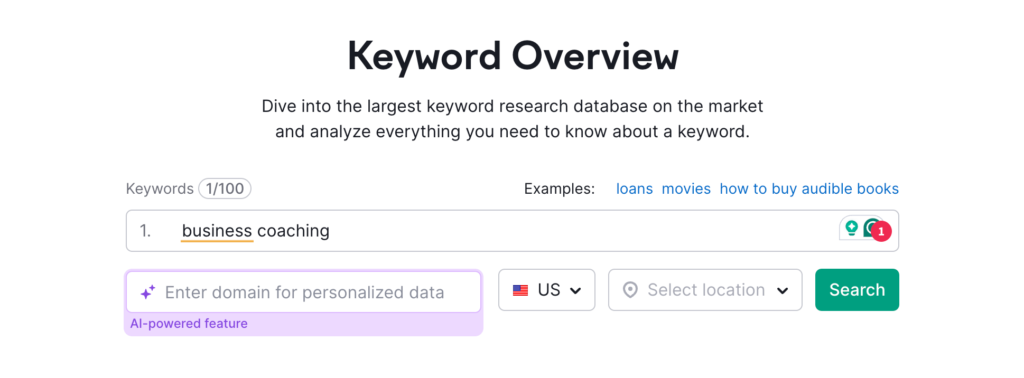
- Keyword Magic Tool
It’s one of my favorite tools for keyword research and generating content ideas. This tool lets you enter your seed keyword (short-tail keyword), and SEMrush will create a list of related keywords, along with their search volume, competitive level, difficulty, cost-per-click (CPC), and other relevant metrics. You can filter and sort this list based on your preferences.
- Keyword Difficulty Tool
This tool helps you understand how hard it would be to rank for a particular keyword. It displays a percentage score, where the higher the score, the more difficult it is to rank for the keyword.
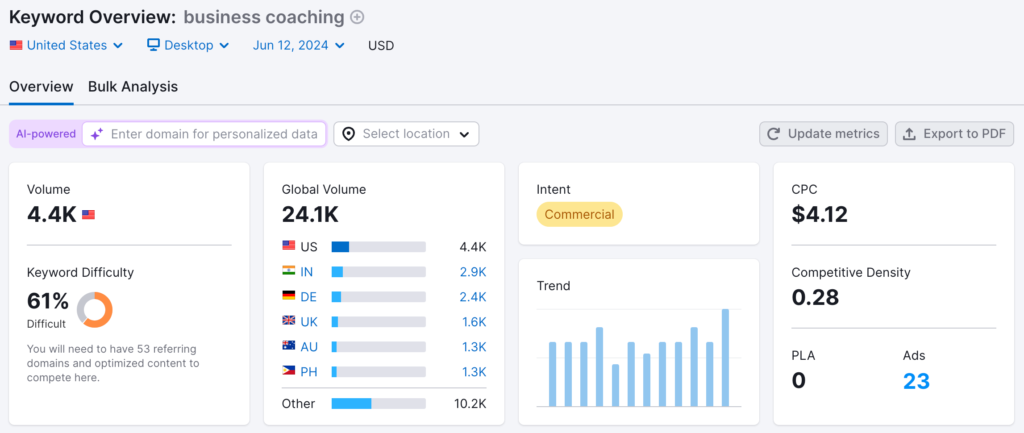
- Keyword Gap Tool
Use this tool to compare your website with your competitors. Enter your domain, and those of your competitors, and SEMrush will curate a list of keywords that you’re ranking for, your competitors are ranking for, and where there are opportunities to improve.
- Organic Research Tool
This tool shows you the keywords a specific website is ranking for. Simply enter a competitor’s domain to see a list of keywords they’re ranking for, the position they are in, and the page that’s ranking.
- Organic traffic insights
It shows ‘not provided’ keywords driving organic traffic to your website. Semrush is integrated with Google Analytics to unveil these hidden gems and exact search terms that potential customers use to find your business.
Semrush gives an opportunity to conduct in-depth keyword research and create a successful keyword strategy for a coaching business. It shows the most valuable keywords to create high-quality, informative content to attract more coaching clients and improve your search engine rankings.
Examples of keywords for life coaches
Keywords for life coaches can vary depending on the target audience, the specific niche, and the services offered. However, some of the general examples of keywords for life coaches include:
General life coaching keywords:
- Life coaching
- Life coach
- Personal development
- Self-improvement
- Goal setting
- Success
- Fulfillment
Niche life coaching keywords:
- Career coaching
- Online life coach
- Life coach for personal development
- Life coach for mental health
- Life coach for relationships
- Life coach for motivation
- Life coach for stress management
- Life coach for entrepreneurs
- Spiritual coaching
Examples of keywords for business coaches
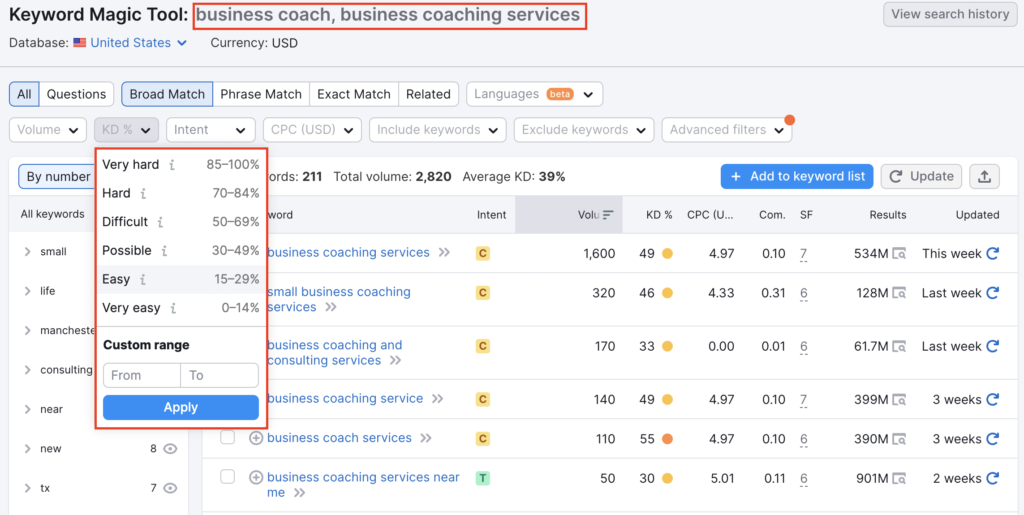
See the screen for how you can search for coaching keywords ideas with Semrush.
General business coaching keywords:
- Business coaching
- Business consulting
- Entrepreneur coach
- Business coach
- Startup coach
- Business growth coach
Niche business coaching keywords:
- Sales coach
- Leadership coach
- Financial coach
- Marketing coach
- Executive coaching
- Productivity coach
- Business mentor
- Small business coach
I recommend using tools like SEMrush and Google Keyword Planner to identify the most relevant and effective keywords for your specific coaching niche and target audience.
2. Creating SEO-Optimized Content for Coaches
Creating high-quality, informative content that’s optimized for search engines is essential to the success of your coaching SEO strategy. Here are some tips on how to create SEO-optimized content:
- Use your target keywords
Once you’ve identified your keywords, incorporate them in your page titles, headings, and meta descriptions. Use the right keyword density and avoid overusing them. Proper keyword placement and distribution in your content play a significant role in search engine ranking.
Make sure the keywords sound natural in the content. Plus, they should make grammatical sense.
- Create valuable content for your potential coaching clients
I can’t stress enough how crucial it is to create content that addresses the needs and concerns of your target audience. This will help attract and retain visitors to your website.
- Consider on-page SEO optimization
Linking to other pages on your website will help visitors navigate your content and improve your site’s ranking on search engines.
How to generate content ideas for coaches
Coming up with fresh ideas can be a challenge. I love the number of tools offered by Semrush. In fact, this is my full-time marketing assistant!
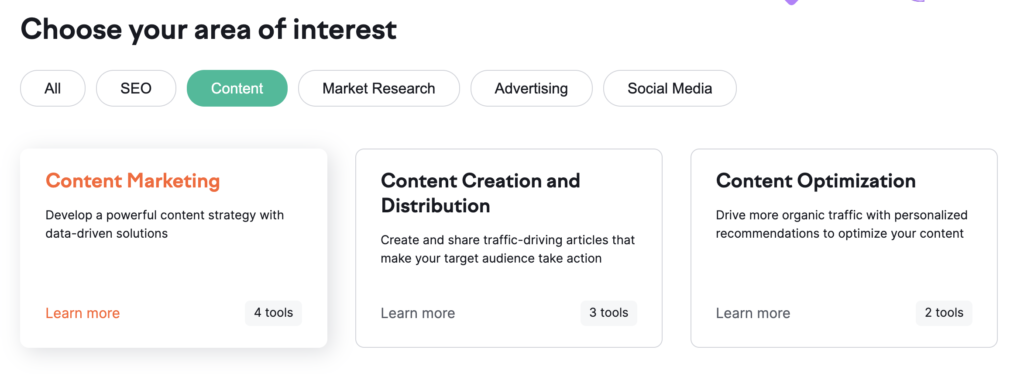
Semrush has a great feature called SEO content template. All you need to do is to put some coaching keywords.
Once you click Create a content template, Semrush will show you recommendations based on the top 10 search results:
- Semantically related words;
- Backlinks opportunities;
- The average readability score;
- The average text length
- Article examples of competitors using the same keywords
This information helps so much to create creative content and understand the SEO strategy to beat the competition!
Here are some other tips on how to generate content ideas for coaches:
- Understand your audience
What are your clients looking for? Is there an information gap that you can fill? Pay attention to the questions they ask and the topics they are interested in. Use this feedback to create content that addresses these specific needs, interests, challenges, and concerns.
- Keep up with industry news
By keeping up to date with the latest happenings in the industry, you can create timely and relevant content.
- Tap into your expertise
As a coach, you have a wealth of knowledge and experience to draw upon. Use your expertise to create content that addresses common questions or challenges that clients face.
For example, you could share practical tips for self-care or goal setting. You could also share success stories or case studies that demonstrate your credibility and offer actionable advice.
- Repurpose old content
Keep your content fresh and reach new audiences. For example, take a blog post that attracted many clicks and turn it into a podcast or video episode.
- Use Semrush to generate content ideas for your coaching website.
Semrush Topic Research feature generates a list of potential subtopics that include headlines, questions, and related searches. In addition, SEMrush’s Content Audit tool automates the process of auditing all your existing content and provides you with all the data you need to develop a powerful content strategy.
How to write content for a coaching website
As a coach, you need to create content that resonates with your target audience. Write content that strikes a balance between informative, engaging, and persuasive. Keep in mind that your website serves as a powerful medium to attract potential coaching clients, establish your expertise, and showcase the value you can provide as a coach.
Here are some key concepts to follow to create content that engages and inspires your audience:
- Use catchy headlines
Your headline is the first impression visitors see when they open your site. Make it attention-grabbing and compelling. Moreover, use strong, action-oriented language to entice readers to explore further.
- Clearly state your value proposition
What sets you apart as a coach, and why should potential clients choose you? Use case studies and testimonials to demonstrate the positive impact you’ve had on clients’ lives.
- Provide value
Make sure your website offers valuable insights and actionable advice to your audience. Share tips, strategies, and resources that can help them achieve goals or overcome challenges.
- Use a conversational tone
This helps establish a connection with your readers. Use simple language and avoid jargon.
- Incorporate visuals
Visual elements like infographics, images, and videos can enhance the visual appeal of your website and make your content more engaging. Visuals also help break up your text, making it more readable.
- Optimize for search engines
Most importantly, optimize your content for search engines by using relevant keywords and meta descriptions. Doing so will help your content rank in search engines and attract more visitors to your site.
3. Optimize coaching content for SEO
Creating content for your coaching website is a good thing. But optimizing your website for SEO makes it even better. Here are some of the best practices to optimize your coaching website content for SEO success:
- On-page elements
Make sure your website’s title tags, meta descriptions, and URLs accurately reflect the content on each page. Incorporate keywords naturally into these elements to improve search engine visibility. In addition, use header tags (H1, H2, H3) to structure your content and make it easier for search engines to understand the hierarchy and relevance of your information.
- Optimize local SEO
You most likely offer your coaching services in a specific location. In that case, local SEO is essential.
Create a Google My Business profile and ensure that your business name, address, and phone number (NAP) are consistent across all online directories. Be sure to add location-specific keywords in your website content, meta tags, and headings. Moreover, encourage clients to leave reviews on platforms like Google My Business and Yelp.
- Make your website mobile-friendly
More and more people are using their mobile devices to browse. Therefore, optimize your website to be mobile-friendly and fast-loading. You can do so by compressing images, leveraging caching techniques, and minifying code.
4. Converting SEO Traffic to Sales
To convert your SEO traffic into paying clients, follow these steps:
Lead Magnets: Offer valuable content (like PDFs or videos) to entice visitors to join your email list.
Email Marketing: Use platforms like Mailchimp or ActiveCampaign to nurture leads and convert them into clients.
Sales Funnel: Develop a sales funnel using email sequences, webinars, and sales pages to guide prospects toward purchasing your services.
FAQs about SEO for coaches
1. What are the Best SEO Keywords for Life Coaching?
The keywords should reflect your coaching services. Here are some effective keywords:
- Life Coach Near Me
- Personal Development Coach
- Career Coaching
- Relationship Coaching
- Mindset Coaching
- Executive Coaching
- Health and Wellness Coaching
2. How Do You Optimize a Website for Local SEO?
Optimizing for local SEO helps attract clients from specific geographic areas. Here’s how to do it:
- Google My Business (GMB): Create and optimize your GMB profile with accurate information, high-quality photos, and regular updates.
- Local Keywords: Use keywords that include your city, state, or region (e.g., “Life Coach in New York”).
- NAP Consistency: Ensure your Name, Address, and Phone number are consistent across your website and online directories.
- Local Citations: Get listed in local directories and online business listings.
- Reviews: Encourage satisfied clients to leave positive reviews on your GMB profile and other review platforms.
- Local Content: Create blog posts and content that address local events, news, or issues relevant to your audience.
- Schema Markup: Use local business schema markup to provide search engines with detailed information about your business.
3. What are the Best Practices for SEO in 2024?
SEO continues to evolve, and staying updated with the latest trends is crucial. Here are the best practices for 2024:
- AI and Machine Learning: Utilize AI tools to analyze data, predict trends, and optimize content.
- Voice Search Optimization: Optimize for voice search queries, which are typically longer and more conversational.
- Core Web Vitals: Focus on improving core web vitals such as loading speed, interactivity, and visual stability.
- Video Content: Incorporate video content as it engages users and can rank well in search results.
- E-A-T (Expertise, Authoritativeness, Trustworthiness): Build content that demonstrates your expertise and authority, and ensure your website is trustworthy.
- Mobile-First Indexing: Ensure your website is fully optimized for mobile devices, as Google primarily uses the mobile version of a site for indexing and ranking.
- Content Experience: Create content that provides a great user experience, including easy navigation, clear structure, and engaging visuals.
- Structured Data: Use structured data to help search engines understand your content better and enhance search results with rich snippets.
- Sustainability Focus: Reflect your commitment to sustainability and ethical practices, as this is valued by users and can impact search rankings.
Conclusion
SEO for coaches can grow your coaching business and help attract new coaching clients by improving your website’s visibility on search engines. To get started with coaching SEO, conduct keyword research, optimize your website content, build backlinks, and monitor your website’s performance.
Over time, you’ll improve your site’s visibility and attract more visitors who will potentially convert into clients.
Remember, SEO is a long-term strategy, but with persistence and patience, it will pay off.
Tetiana is a business coach and owner of IStartHub, a business media for ambitious female entrepreneurs and small business owners.

